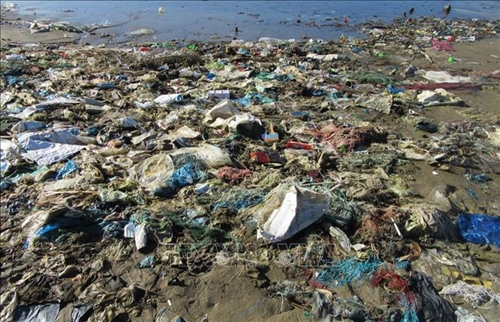This year, within ASOEN cooperation, Vietnam will promote cooperation and sharing of information, data, and experience, and perform well its role as the host country of the 11th AWGCC Meeting, the 5th ASEAN Environmentally Sustainable City (ESC) Award, the 4th ceremony to award the potential ESC certificate.
    |
 |
|
Marine plastic debris is seen one of the biggest among environmental challenges facing ASEAN countries. (Photo for illustration) |
Vietnam will proactively participate in and cooperate closely with Japan and other ASEAN member countries in implementing the ASEAN-Japan cooperation project on environment, climate change, and marine waste, while maintaining close cooperation with the Republic of Korea and other member states to carry out cooperation programs and projects on the environment and climate change.
It will work with partner countries and international organizations to implement ASEAN cooperation activities on the environment, especially Norway, Germany, the European Union (EU), and the German Development Cooperation Agency (GIZ).
As a responsible member of the ASEAN Community, in 2020, Vietnam demonstrated its efforts and determination to successfully fulfill assigned responsibilities, significantly contributing to the regional integration process in terms of natural resources and the environment, as well as played a crucial role in expanding environmental cooperation with countries and international and regional organizations.
Marine plastic debris, and marine and coastal environmental problems are seen as the biggest among environmental challenges facing ASEAN countries, the office said.
Vietnam strongly supports the building of an ASEAN action plan on marine plastic waste prevention, said Nguyen Que Lam, Deputy Director-General of the Vietnam Administration of Seas and Islands and head of the ASEAN Working Group on Coastal and Marine Environment (AWGCME).
Through jointly building and implementing the regional action plan, ASEAN member states will agree on common standards, concepts, and data, and jointly build a regional foundation serving sharing of knowledge, experience, and advanced applications in monitoring and minimizing plastic waste, he stressed.
Vietnam has been recognized as a country with high biodiversity in the world. The biodiversity has made a great contribution to ensuring food security and livelihoods for people, maintaining genetic resources of animals and plants; supplying construction materials and fuel and pharmaceutical sources, and forming natural landscapes.
Vietnam has actively joined international treaties on biodiversity such as the Convention on Biological Diversity, the Ramsar Convention, the Convention on International Trade in Endangered Species of Wild Fauna and Flora (CITES), the UN Framework Convention on Climate Change (UNFCCC) and the UN Convention on the Law of the Sea (UNCLOS).
Regarding the building of the ASEAN action plan on marine plastic waste prevention, Vietnam and other ASEAN member countries have shown a spirit of cohesion to coordinate with the international community in solving global environmental issues.
At the 31st Meeting of ASEAN Senior Officials on the Environment (ASOEN 31) and related meetings, the Vietnamese delegation actively contributed comments and proposals to important issues, demonstrating its responsibility for the region, and strengthening multilateral relations as well as ties with each country within ASEAN and ASEAN+3.
Vietnam also petitioned other ASEAN member countries to address urgent environmental problems, including cross-border water and air pollution, ocean plastic debris and climate change.
Amid the COVID-19 pandemic, Vietnam also called on ASEAN member countries to closely cooperate and gather resources to effectively control the crisis.
Source: VNA